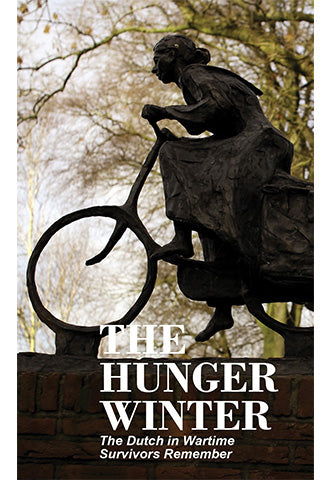Dutch the store
The Hunger Winter
Couldn't load pickup availability
The Dutch in Wartime: Survivors Remember is a series of books with wartime memories of Dutch immigrants to North America, who survived the Nazi occupation of The Netherlands.
Book 8, The Hunger Winter, contains memories of the devastating winter of 1944-45 when a famine, intentionally brought about by the Nazi occupation forces, ravaged the Netherlands. More than 200,000 people suffered from severe malnutrition and an estimated 20,000 people died of starvation.
Designed and written to be easily accessible to readers of all ages and backgrounds, these books contain important stories about the devastating effects of war and occupation on a civilian population.
Edited by Tom Bijvoet and Anne van Arragon Hutten.
103 pages
Historical background, map and 49 wartime memories.
ISBN: 978-0-3968308-9-1
On the cover: ‘Woman on a Hunger Trek’, sculpture by Tineke Bot, commemorating the women who went to the countryside during the Hunger Winter to find food for their families. (Photo: Rick Gleichmann)
READ AN EXCERPT
I was born on June 30, 1941. My family lived on the Boezem Singel in Rotterdam. The winter of 1944/45 was extremely cold. There was no food, no coal, and no electricity. People began going to the countryside to try and barter their cherished possessions for any type of food. My brave mother took the baby buggy (without a baby), walked to the German barracks, climbed over a fence and tried to steal their food.
Near us was a soup kitchen for children, where my sister and I had to go to get ‘soup’ which was nothing but some type of broth with one or two peas in it. However, we ate whatever we could find. My father and mother both suffered from hunger oedema because whatever food they could find they gave to us children. As there was no fuel whatsoever, people started secretly cutting down trees. Some also burned their cherished antiques in the coal stove.
People died of starvation in the streets. My father had heard about a man who sold potatoes but when he went there, the man charged 100 guilders for five pounds of potatoes. The black market was thriving and people parted with everything they had just to get some food.
Although the war was over on May 5, it continued to be the main topic of conversation at the dinner table for a long time afterwards. To this day I have a great respect for food. I will not throw food away. I cherish every meal I eat, and I am grateful to those brave Canadians and Americans who saved us from total starvation.
Doortje Shover
Newark, Delaware

